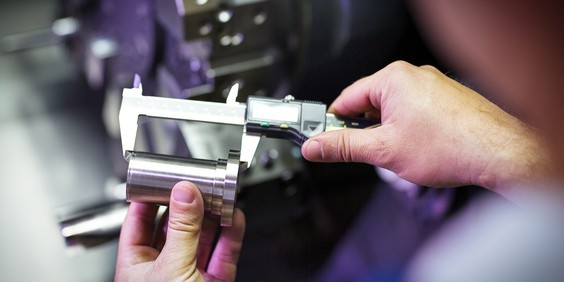
Our Case Studies
A proven track record is the best way to demonstrate our strength and depth of expertise. Below are examples of our team’s recent appointments.

Automotive
Metallgießerei Scheeff
The automotive supplier Scheeff, based in the German federal state of Baden-Württemberg, had to file for insolvency some years ago. The PLUTA insolvency administration team kept the business going for almost one year and implemented important restructuring measures. Some 1.5 million euros had to be invested during the insolvency proceedings to meet official and other requirements. Following intensive negotiations, a solution was found for the company. A well-known group of companies from the region with over 1,000 employees acquired the foundry and kept on more than 100 of its employees. Creditors received a recovery rate of more than 20%.

Automotive
GfI Gesellschaft für technische Ingenieurleistungen mbH
GfI employed many highly qualified people, but sales still declined, as its focus on customers in the automotive sector proved to be a problem. In order to best position itself for other industrial sectors as well, GfI filed an application for debtor-in-possession insolvency proceedings. Management remained in charge and guided the company through the crisis itself. A PLUTA expert was appointed as insolvency monitor by the court to protect the interests of the creditors. The company was restructured during the proceedings and was sold to and integrated into an engineering service provider group with international operations.

Automotive
QSSL Industrieservice GmbH
QSSL Industrieservice GmbH, based in the German federal state of Baden-Württemberg, was a provider of quality assurance services as well as various services for the automotive sector in particular. The company, with several /our-firms in Germany, had to file for insolvency in 2019. Just two months later, the PLUTA restructuring experts managed to find a follow-up solution which ensured that all jobs were saved. The business has been acquired by TRIGO Böllinger Technik from Bremen, the German subsidiary of the renowned TRIGO Group based in France.

Automotive
Townsend Jaguar Rover
We were appointed the financial adviser to the debtor in the Townsend bankruptcy cases. The dealerships were in a heated dispute with the manufacturer leading to the BK. The team were able to market the dealerships in the BK based on the projected future profitability rather than the recent historical profitability. As a result, the dealerships sold for one of the largest goodwill prices ever paid for Jaguar Rover stores. GlassRatner won a category Middle Market Deal of the Year Award for this transaction.

Automotive
Honda of Downtown LA
We were appointed receiver of the franchised dealership in 2011. The dealership was over $7M out of trust leading to the motion to appoint a receiver. The team operated the dealership for approximately 8 months and ultimately sold the dealership for a significant amount of goodwill given the lack of historical profitability and out of trust condition.
The team cut the operating expenses to minimize the losses while marketing the dealership based on the projected sales volume and composite financial metrics of Honda in the region, rather than the dismal historical performance of the dealership. This led to a sale price with a meaningful goodwill component.

Automotive
Groupe Arche
The main activity of Groupe Arche was casting, machining and assembling aluminium parts for the automotive industry, mainly for engines (carters, oilpans, etc.). The group possessed three high pressure aluminium foundries, two in France and one in Spain, and in 2017 employed more than 900 people, including temporary staff. Its main customers were Renault, with whom the group had an interdependent relationship, and Daimler.
At the time that the company first came to Zalis for help the group had severe cash flow problems, the holding company and one of the group companies were in administration and two other group companies were under the protection of the court in a voluntary procedure called “sauvegarde”, which in some but not all aspects is similar to Chapter 11 in the USA.
In November 2016 following the abrupt departure of the entire senior group management team following the sale of a factory, Zalis was asked to conduct a flash analysis of the situation in order to establish a snapshot of the issues facing SAM (the group’s flagship factory that accounted for more than half of group turnover) and to make recommendations to improve the management and the financial results of the business.
At the time the aluminium foundry market in Europe had insufficient capacity and the combination of exceptionally high volumes and the legacy of historical under‐investment, together with the departure of the senior management team, meant that there many serious operational issues. There had been a significant deterioration in the levels of quality, productivity and customer service.
Following the initial report, in December 2016 Zalis was engaged for an operational assignment in order to provide experienced interim management for the group and to start the implementation of our recommendations, while the administrator launched a sale process for the group’s principal sites.
Zalis provided a full time CRO at SAM, the largest company in the group, as well as a finance director, a supply chain manager and a maintenance manager. Zalis also provided the chairman of FVM, the other French factory, and directors for the group holding company and two of the operating companies, to help guide the group towards the optimal outcome for all its stakeholders.
For various reasons the sale process lasted far longer than is normal in these circumstances, but Zalis provided operational support and strategic advice throughout the process. The sale process was in fact seriously disrupted, first by the strategy of the majority shareholder, which was to put itself in a position to make an uncontested offer for some of the group companies without making any further investment, and then by union disputes and strikes as the employees became more and more frustrated and concerned about their future.
Eventually, in December 2017 the three factories were sold in an asset deal to a Chinese industrial investor. More than 90% of the jobs at the factories were saved and the acquirer made firm commitments to make substantial long term investment in the three plants in order to bring them up to the levels of quality and efficiency that its customers required.

Automotive
Amcast Industrial Corporation
100-year-old company manufacturing components for the automotive industry. Main products were wheels and steering assemblies. Operated five plants in the US and two in Italy.
The Italian plants, operated by the Speedline subsidiary, were poorly managed and plagued by union discord with management and disputes among the six independent unions representing the workforce. These plants operated at significant losses, consuming cash to the point where the US lenders felt their loans were at risk of default. Accordingly, they cut off all US funding of the Italian operations.
In addition, the Italian banks reduced Speedline’s availability because of their losses and their exposure to Fiat, which at the time was struggling.
Implemented weekly cash management procedures, which included negotiating better terms with customers e.g. Mercedes Benz agreed to pay in 10 days instead of the customary 60 to 90 days. The weekly cash calls lead to an intense focus on operations including:
- Inventory turnover and just in time delivery
- Lean manufacturing
- Speeding up change overs from product to product to reduce downtime
- Tracking how far a part travelled in the plant to identify inefficient material handling
- Renewed attention to each plants safety performance
- Strict controls on overtime. For example at the Richmond plant, machines with 10 stations were running with 5, causing 7 day operations and excessive overtime.
- Strict controls and reporting on scrap and maintenance supplies
- Significant headcount reductions across the board
The Italian operations were eventually sold for virtually no net proceeds , but the US operations gradually improved as the turnaround effort took hold.
We negotiated a series of forbearances with the lenders that enabled Amcast to have sufficient liquidity to bid on new business and fund the required tooling to produce the newly awarded contracts.
Customers continued to apply price reduction pressure. This downward pressure on profitability was partially mitigated by a Chinese wheel manufacturing joint venture.
Eventually the turnaround attracted the attention of distressed investors , who were able to acquire the secured lenders debt at a discount. The hedge fund then implemented a “loan to own” in order to acquire the business through a Chapter 11 filing.
Unfortunately, the new owners decided not to retain, in spite of our strong recommendation, the management that had worked on the turnaround. New management took a very adversarial stance to Amcast’s major customer, resulting in that customer exercising its right to terminate and transfer the business to alternative suppliers. Having lost most of its business the company liquidated, resulting a total loss to the distressed investors.

Automotive
OE Quality Friction Inc.
OE Quality Friction (OEQF) was founded in 1997 on the principle of marketing Original Equipment quality disc brake pads at competitive aftermarket prices.
As a result of breaches to the debtor’s borrowing base covenants we were initially appointed to complete a review of the business and its plans as well as a review of its projected cash flow forecast. It became evident that the business was suffering from high overhead costs due to an unnecessarily lengthy transition of its operations from Canada to Mexico as well as reduced gross margins.
Farber were appointed as receiver of the business in order to gain control over the cash bleed and complete a sale of the business.
The results were as follows:-
- Completed the transition of the operations from Canada to Mexico significantly reducing overhead costs.
- Oversaw creation of 3-week rolling production plan, thereby increasing profitability by prioritizing higher gross margin products and reducing change over time
- Worked with the corporate finance team to sell the business expeditiously
- Created monthly and weekly forecasts including operational and financial key performance indicators
- Prepared monitoring and reporting templates
- Pursuit of realizations on all assets of the business including trapped inventory and litigious accounts receivable

Automotive
Geiger Technologies GmbH
In the case of Geiger technologies GmbH, PLUTA Rechtsanwalts GmbH succeeded in selling company shares to the Dutch investment company HTP. Geiger technologies supplies the car industry with components and generated revenues of approximately € 100 million. The insolvency Administrator, Dr. Martin Prager, succeeded in turning the company around. The Local Court of Weilheim had opened insolvency proceedings on 1 February 2009. Proceedings ended in mid-2015.
Find an Expert
Find the right professional using the below dropdowns. Our reach covers the globe with a network of over 300 offices.
Or, browse by location
Latest News
View All Latest News25/03/2025
BTG Global Advisory Holds AGM in Hong Kong
BTG Global Advisory held its AGM on March 20-21, 2025, at the Kowloon Bowling Green Club in Hong Kong. The meeting brought together senior partners, managing directors, and financial experts from around the world to discuss strategic initiatives for future growth. As a leading international alliance of independent advisory firms, BTG Global Advisory continues to expand its influence across markets, addressing emerging trends and industry challenges.
10/03/2025
UK Care Homes: The UK’s ageing population is a shared challenge and opportunity
The UK’s care home market is undergoing substantial evolution, presenting opportunities for investors amid growing demand and complex structural headwinds. While an ageing population intensifies pressure on the NHS with rising waiting lists and increased prevalence of chronic health conditions, it also drives significant investment appeal in the care sector.
27/02/2025
UK construction: fragile confidence in a sector awash with rising costs and uncertainty
The UK construction sector is grappling with persistent headwinds. Growth in construction business activity has softened to the slowest pace since June 2024, according to the S&P Global UK Construction PMI. Headline construction PMI fell to a six-month low of 53.3 in December.
25/02/2025
UK Trade: risks and opportunities in a diverging two-speed economy
The UK’s annual trade deficit narrowed by £14bn to £25.1bn in 2024, according to the latest ONS data. However, this masks a growing divergence between services and goods trade. Services exports remain a bright spot, while goods exports continue to decline, deepening the UK’s two-speed economy.



